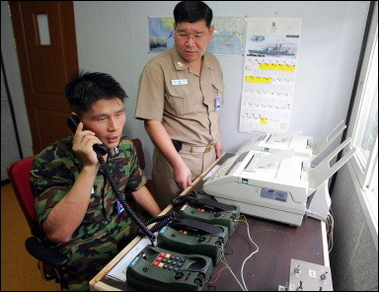|
South Korea, DPRK open first direct commercial phone links
(Xinhua)
Updated: 2005-12-28 14:38
South Korea and the Democratic People's Republic of Korea (DPRK) held
ceremony Wednesday at Kaesong, a DPRK border town, to mark the opening of the
first direct commercial land-line phone links between the two countries.
South Korean Information Minister Chin Dae-je attended the ceremony and
delivered a congratulatory speech in which he expressed hope the new phone
service will help spur mail, Internet and other information technology exchanges
and cooperation between the two sides, reported South Korean major news agency
Yonhap from Kaesong.
"We are ready for talks with North Korea (DPRK) on expanding across-the-board
exchanges and cooperation in the IT sector," Chin was quoted as saying by
Yonhap.

A South Korean soldier talks to a northenr
counterpart. South and North Korea have opened cross-border commercial
communications lines for the first time since their division in 1945.
[AFP/file] | The phone connection between the DPRK's border city of Kaesong and South
Korea marks another step forward in relations between the two nations.
Some 360 South Koreans including lawmakers and civilian delegates attended
Wednesday's ceremony, with 40 DPRK officials, mostly communication experts,
joining the event, said Yonhap.
During the ceremony, participants made test calls between the two sides.
About 15 South Korean medium-and-small size enterprises had built or are
building their factories in the pilot zone of an industrial park in Kaesong.
The new phone service will drastically cut communication costs for South
Korean firms had entered the Kaesong Industrial Complex. Up to now, the South
Korean firms at the park have relied on four satellite phone lines which are
connected with South Korea via a third country. They are six times more
expensive than the land lines.
Kaesong Industrial Complex is one of three inter-Korean cooperation projects
which aims to combine South Korean investment and technology with DPRK's cheaper
but skilled labor force.
South Korea estimates some 1,000 South Korean companies are expected to
relocate their factories to the park within next three years from 2006.
Before the opening of the land-line phone links, the two countries only had
two set of direct hotlines between their military authorities.
|